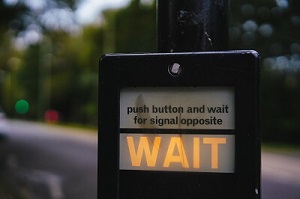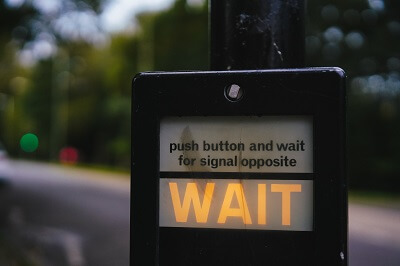We inhabit a fast-paced world and we tend to want to do things quickly. More than ever, we need people to wait before they avail of the things they need because others also want the same thing and they were the first ones in the queue.

That is why it is but proper to say the right words at the right time and also in the most appropriate quantity of time to wait for the services they need. It is important to be civil, courteous, and vigilant of what we say because we can hurt emotions and also affect productivity because of hurtful or inappropriate words.
We can tell people to wait in a formal, casual, or street form way of expressing it, depending on the situation.
Using “Hold on please” is the safest phrase to tell someone to wait. It leaves some degree of flexibility on how long it might take. If you already know that it will take longer than a few minutes, be clear about that.
If the situation also allows for some humor as we tell people to wait, so much the better.
General Phrases To Tell Someone To Wait
Here are some generic examples. You can use them on the phone or at work, or with your neighbors and friends.
Professional Manner
“Please bear with me…”
“I won’t be long…”
Casual Manner
“Just a sec…”
“Just a second…”
“Just a minute…”
“Just a tic…” (Australian)
Slang Style
“Hang tight…”
“Hold on…”
“Hang on…”
“Gimme a minute…”
“Hold your horses…”
Of course, if the situation is a precarious scenario or an emergency such as in a hospital intensive care unit or a morgue identifying human remains, you can’t use both casual and slang styles. Stick with the professional manner of phrasing that they have to wait so as not to ruffle any feathers or hurt any panicky emotions.
If You Need More Time, Stop Using Wait A Moment
We are constantly abusing and even wrongly using the phrase “Wait A Moment” when we mean that the person we are saying it to is required to wait for a much longer time. Even if it was said politely and courteously.
How long does a moment exactly mean? It means approximately 1 second or a very short time.
Other ways of saying it is:
“Give me a second.”
“Give me a moment.”
“Hold on a sec.”
“Just a moment.”
This is a milder form of “Wait a Moment” because of the word Just.
All the above connote a very short period of around 1 second.
So, to be sure that you are not creating a grave miscommunication with the person you are talking to, use words or phrases which connote a longer period.
Here are some examples:
“You might have to wait for a while.”
A while is longer than a moment. A while connotes around 3 to 10 minutes of their time, at least.
“Hold on please.”
This is a very safe answer for people who have to wait. You didn’t promise a specific time, just “Hold On”. So, the individual to whom you’ll be saying this can’t get angry if you returned to that person approximately 20 minutes after saying “Hold On”.
But don’t put that person on hold for more than 20 minutes because this won’t be an appropriate response anymore.
If You Need People To Wait For More Than 20 Minutes
If you can’t accomplish what people are requesting from you in 20 minutes, be frank with them outright. It’s better to let them be annoyed for a minute at the consequence of having to wait for a longer time than for them to anticipate that you will do your service (based on your way of communicating your words) in a short time and you cannot deliver.
They will have an immediate image of you as being “ineffectual and inefficient”. So, choose your words carefully.
You could say:
“I have an emergency to take care of. I’ll get back to you in the afternoon.”
This type of response will make the person spoken to into a meek lamb. The mention of the word Emergency means that life or some life-threatening situation is forthcoming and it is more important than serving your needs at the moment which might be superficial. That person will even be considered Inconsiderate if he reacts angrily to this request for him to wait for half a day.
Or
“Thanks for contacting me on this. Yes I know it’s important for you to complete this now but…”
This kind of response is safe. You don’t set a deadline for yourself to complete a task at once for this person. This kind of response makes the person realize that someone else was first in line in the queue and you have to service this client first, based on a First in First Out Policy.
“I commit to getting this information to you before the end of the week.”
This type of response, when spoken, will make the recipient expect the task to be done by Friday, the least, and Sunday, the maximum. So if you promised this on a Monday, it gives you much leeway on accomplishing the task.
This is also a response that gives you much leeway on what you promise the recipient. Optional add-ons to this sentence are, “I hope to give you what you want by Monday”.
Or
“Please give me 3 days to work on this and I’ll deliver it to you.”
Don’t make your promise open-ended. Give a specific day or date.
In short, you’re taking control of the situation by eliminating their uncertainty. But most important, follow up on your commitment and accomplish the task on time.
It’s as if you are saying respectfully: “I see and understand your situation. I will work on it. I will have it delivered and you have my word”.
When Taking A Call Not Meant For You
When you pick up the landline phone wherein anybody could pick it up in the office or at home, the first question you should ask is “May I know who this is please?”
Then that person says he wants to talk to another person other than you. If you’re not sure that person is on the premises or available, you could say:
“Could you please hold on for a while? I will inform XX about your call.”
Or if you’re sure of your answer, you could say:
“Would you mind holding on for a while? XX will be with you in 3 minutes.”
When XX arrives, he could continue the call by saying “Thank you for waiting”. He should not say “Sorry” for making you wait because in reality, he didn’t commit any mistake and he shouldn’t apologize.
Saying thank you is more appropriate and polite than saying sorry because it puts you and the recipient on an equal level.
Another way of saying thank you for waiting:
“Thanks for waiting for me” instead of “Sorry for taking your time”.
Words You Should Never Use To People Who Have To Wait
There are some answers that we hear from secretaries, receptionists, and other staff who are one layer away from the actual person who we want to talk to. These people should be trained in the art of making people wait without making them annoyed.
These are some common hiccups that they serve people who are impatient to be responded to appropriately.
Never use sentences like this:
“Sorry but I am a bit tied up right now. Please call back later if you can be entertained.”
“Let’s wait and see if XX can be able to entertain you at another part of the day.”
“You’ll just have to be patient. Other people were here much earlier than you.”
If you are restless yourself and need the services of the person you are asking for and you’re served with any of these responses, you would simply go ballistic. Never, ever let your staff answer your clients or any person for that matter like these. Proper communications training should be urgently carried out if this is always a problem.
Why Tech Might Make Waiting More Enjoyable In The Future
Waiting is perhaps one of the annoying things we have to bear with every day of our lives.
According to a survey, people in urban areas wait an average of 20 minutes per day for a bus or train to ride. They also wait 32 minutes if they visit their physician and also an average of 28 minutes in mandatory security queues when they travel. And do you know that men wait around 21 minutes for their spouse or partner to get ready to go out of the house?
People also spend 13 hours every year waiting to be put on hold for customer service. And annoying traffic makes the average commuter spend 38 hours on the road every year waiting for the cars to move.
That’s why some companies have resorted to making their customers choose between a physical line or a virtual line when waiting. To make the waiting time more pleasant, these companies have adopted virtual queues through apps.
Through these apps, we still maintain our place in the line and do other stuff and activities while waiting for our turn. The app will just send in a signal when it’s your turn or if, in a few minutes, it will be your turn.

Sophie Hammond is a journalist, psychologist, and freelance speechwriter for people in politics and business. She lives on the edge of the Rocky Mountains with her dog and a lifetime supply of books. When she’s not writing, she can be found wandering through nature or journaling at a coffee shop.

